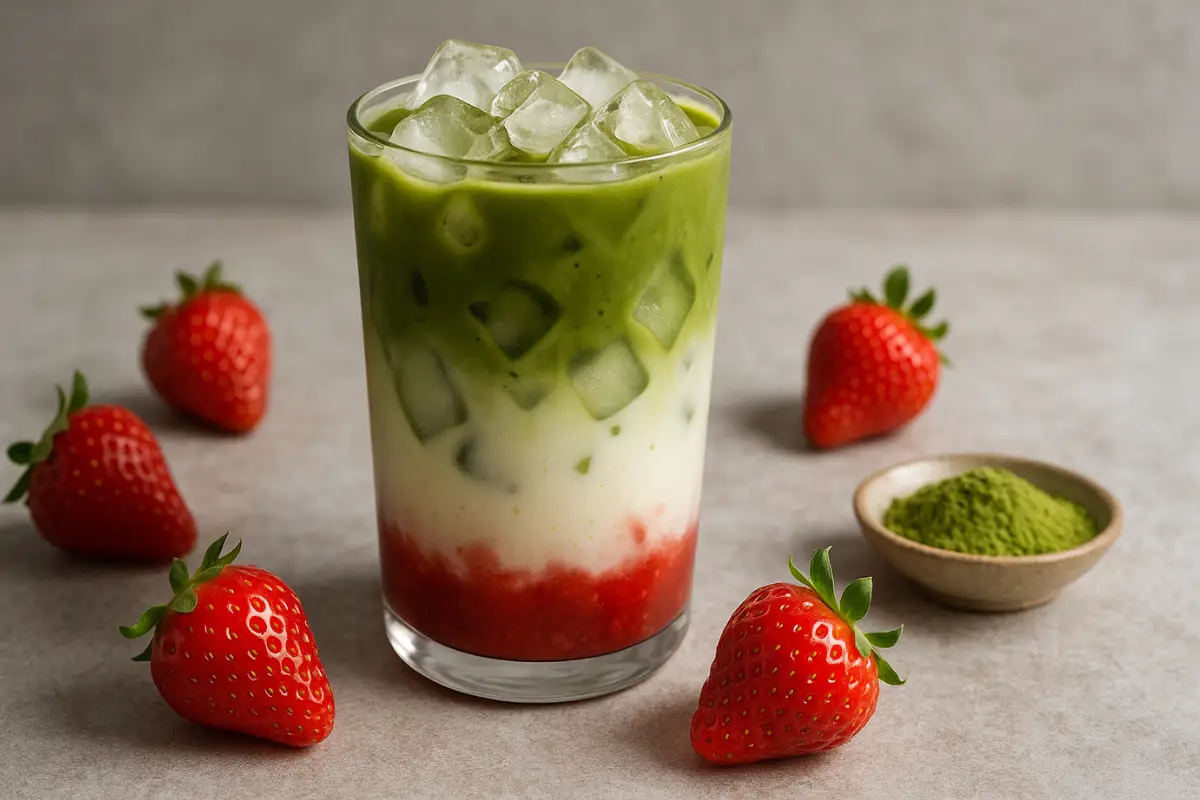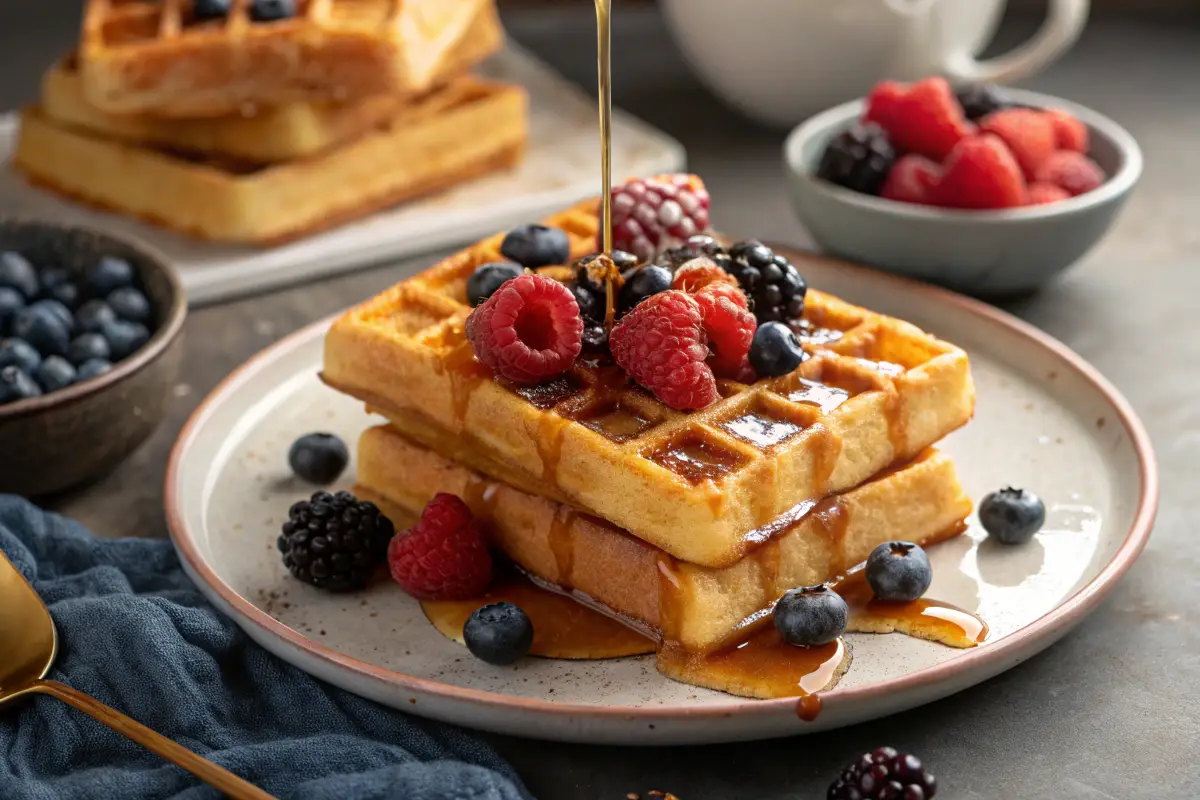Ever thought about the sweet liquid in your pantry and how it might affect your gluten-free diet? Raw honey could be the natural sweetener you’ve been looking for.
For those on a gluten-free diet, finding safe sweeteners can be tough. Honey is a tasty option that’s both nutritious and safe. Raw honey is naturally gluten-free, perfect for those with dietary restrictions.
But, knowing if honey is gluten-free is more complex. Pure honey is gluten-free, but processing and where it’s made can be risky. Mass-produced honey might get contaminated with gluten, which could be a problem.
If you’re exploring gluten-free sweeteners, you might also enjoy our guide to Gluten-Free Rice Krispies or discover ways to incorporate sweet flavors into breakfast with our Gluten-Free Buttermilk Pancakes.
Let’s dive into how honey can be a safe, healthy choice for your diet. We’ll look at its benefits and how it can be a great addition to your gluten-free lifestyle.
This guide will help you understand raw honey and its gluten-free status. We’ll cover its origins and the risks of contamination. You’ll learn about natural sweeteners and their place in a gluten-free diet.
Table of contents
Understanding Gluten and Natural Sweeteners
Dealing with dietary restrictions can be tough, like for those with celiac disease or gluten sensitivity. Gluten is a tricky protein found in many places, making what we eat very important for our health.
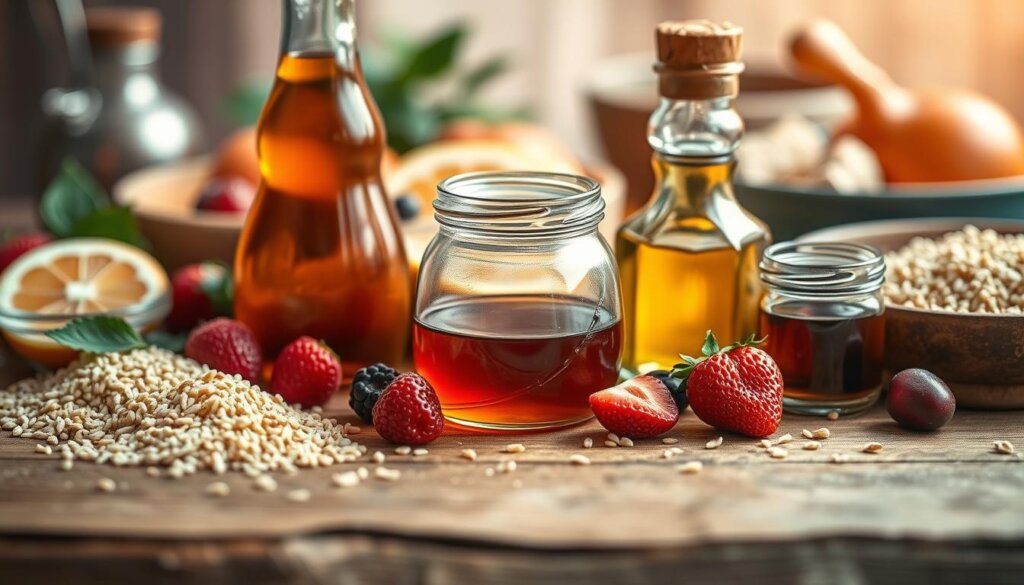
What Exactly is Gluten
Gluten is a protein found mainly in wheat, barley, and rye. For those with celiac disease, it causes an immune reaction that harms the small intestine. This can lead to serious health issues if not handled right.
- Primary gluten-containing grains: wheat, barley, rye
- Hidden sources of gluten include processed foods, sauces, and medications
- Affects approximately 1% of the population worldwide
Common Sources of Gluten
It’s key to know where gluten hides to stay healthy. Many products have gluten, so reading labels is a must for those with gluten sensitivity.
- Bread and baked goods
- Pasta and cereals
- Beer and malt beverages
- Soy sauce
- Processed meats
The Importance of Natural Sweeteners
Natural sweeteners are a better choice for those with gluten issues. They add flavor without the health risks of gluten.
“Food is medicine, and choosing the right ingredients can transform your health journey.”
Choosing natural sweeteners like honey lets you enjoy tasty foods while staying glutenles.
Is Honey Gluten Free: The Complete Answer
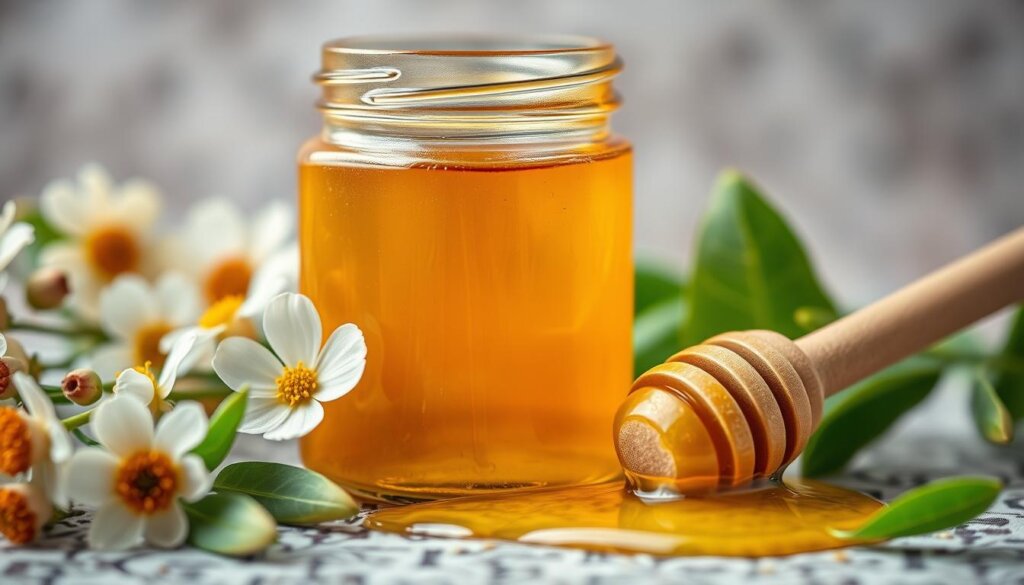
Pure honey is naturally gluten-free. Bees collect nectar from flowers, avoiding wheat or grains. This means no gluten is present in honey.
Raw honey is a great choice for those avoiding gluten. The gluten-free nature of honey comes from its pure, unprocessed state. But, it’s important to watch out for cross-contamination for those with severe gluten sensitivities.
“Not all honey is created equal – understanding its source is key to ensuring gluten-free purity.”
- Raw honey typically contains no gluten
- Processing facilities may introduce cross-contamination risks
- Check labels for additional ingredients
- Verify manufacturing processes
To ensure honey is glutenless, follow these tips:
| Honey Type | Gluten Risk | Recommended Action |
|---|---|---|
| Raw Honey | Low | Generally Safe |
| Flavored Honey | Medium | Always Check Labels |
| Processed Honey | High | Contact Manufacturer |
Manuka honey is a very safe choice. It has UMF™-graded varieties with full traceability and low contamination risks. The global honey market, worth about $8 billion, focuses on health and transparency.
Even though pure honey is gluten-free, extra ingredients or processing can add gluten. Your best way to stay safe is to read labels carefully and talk to honey makers.
Health Benefits and Nutritional Value of Honey
Raw honey is more than just a sweet treat. It’s a natural wonder with many health benefits. It can boost your energy and support your digestive health. Honey is a nutritional powerhouse.
Antioxidant Properties
Raw honey is full of antioxidants. These natural compounds fight oxidative stress in your body. They help neutralize harmful free radicals that can damage cells.
Research shows honey has a variety of antioxidants. These may:
- Reduce inflammation
- Support heart health
- Protect against cellular damage
Natural Energy Source
Honey gives you a quick energy boost. Its simple sugars, like glucose and fructose, are quickly absorbed. A single tablespoon has 64 calories and 17 grams of carbs.
This makes honey a great natural alternative to processed energy drinks.
Digestive Health Support
Honey’s prebiotic properties are great for gut health. These compounds feed good gut bacteria, supporting digestive wellness. Manuka honey is known for easing digestive discomfort and supporting gut function.
“Honey is nature’s golden remedy, healing from the inside out.” – Nutritional Expert
Choose raw, unprocessed honey to get the most health benefits. Your body will appreciate this delicious, nutrient-rich natural sweetener.
Types of Honey and Cross-Contamination Risks
Learning about raw honey, organic honey, and local honey helps you pick the right sweet treat. Not all honey is the same. It’s important to know about cross-contamination risks, which are key for those with gluten sensitivities.
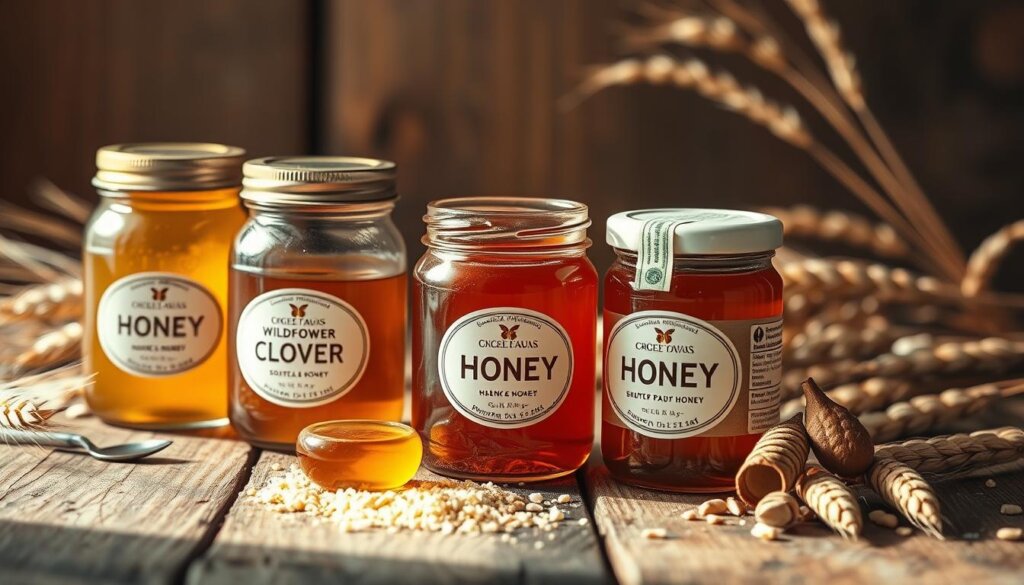
- Raw honey retains more natural nutrients
- Organic honey ensures no harmful pesticides
- Local honey supports community beekeepers
Cross-contamination can happen during honey making. Bees fly far to gather nectar, sometimes through fields with wheat or grains. This means they might pick up gluten.
| Honey Type | Gluten Risk | Recommended Brands |
|---|---|---|
| Raw Honey | Low | Nature Nate’s, Beekeeper’s Naturals |
| Manuka Honey | Moderate | Comvita, Greenbow Organic |
| Processed Honey | High | Check labels carefully |
To lower risks, look for certified gluten-free labels. Choose honey made in places that only make glutenless products. Always check the nutrition labels and talk to the makers if you’re worried about contamination.
“Pure honey is naturally gluten-free, but processing can introduce unexpected risks.” – Honey Safety Expert
If you’re unsure, pick local honey from trusted places. Your health and peace of mind are worth the extra effort.
Comparing Honey to Other Gluten-Free Sweeteners
Exploring natural sugar substitutes opens up a world of delicious alternatives for those seeking gluten-free options. Honey is a great choice, but other sweeteners offer unique benefits to enhance your culinary experience.
There’s a wide range of natural sweeteners to choose from. Each one has its own special qualities that can meet your dietary needs.
Maple Syrup: A Nutrient-Rich Alternative
Maple syrup is a strong natural sugar substitute. It comes from maple tree sap and is full of minerals like manganese and zinc. Gluten-free dieters can enjoy maple syrup as a tasty alternative to regular sweeteners.
Agave Syrup: Understanding the Pros and Cons
Agave syrup is a unique sweetener, but it has some points to consider. It’s gluten-free but highly processed and has more fructose than honey. Nutritionists suggest using it in moderation.
| Sweetener | Calories per Teaspoon | Glycemic Index | Unique Benefits |
|---|---|---|---|
| Honey | 20 | 57 | Antioxidants, Antibacterial Properties |
| Maple Syrup | 14 | 54 | Minerals, Rich Flavor |
| Agave Syrup | 21 | 15 | Low Glycemic Impact |
| Stevia | 0 | 0 | Calorie-Free, Natural Sweetener |
Stevia and Other Natural Options
Stevia is a calorie-free natural sugar substitute that’s good for health-conscious people. It doesn’t have the natural energy or antioxidants of honey but offers a sweet taste without calories.
- Coconut sugar mimics brown sugar’s flavor
- Blackstrap molasses offers high potassium content
- Monk fruit sweetener provides intense sweetness with zero calories
Nature offers an abundance of sweet alternatives that can transform your culinary experience while supporting your dietary requirements.
Your choice of natural sugar substitutes depends on personal taste, nutritional goals, and specific dietary needs. Trying different sweeteners can help you find the perfect match for your gluten-free lifestyle.
How to Use Honey in Gluten-Free Cooking and Baking
Exploring gluten-free baking with honey as your sweetener opens up a world of tasty options. Pure honey is a versatile ingredient that can make your kitchen creations special. It keeps meals safe for those with gluten sensitivities.
Honey recipes can replace traditional sugar in many dishes. Here are some tips for using honey in glutenless cooking:
- Reduce liquid ingredients by 1/4 cup for every cup of honey used
- Lower oven temperature by 25°F to prevent over-browning
- Use 3/4 cup of honey for every 1 cup of sugar in recipes
Honey’s natural properties can enhance your gluten-free baking. Try these exciting ways to use this golden sweetener:
- Create a glaze for roasted vegetables
- Develop energy bars with nuts and seeds
- Sweeten beverages naturally
- Spread on gluten-free toast
| Honey Type | Best Uses | Flavor Profile |
|---|---|---|
| Wildflower Honey | Baking, Marinades | Light, Floral |
| Clover Honey | Beverages, Desserts | Mild, Sweet |
| Buckwheat Honey | Sauces, Dark Baking | Strong, Robust |
“Pure honey transforms gluten-free cooking from ordinary to extraordinary!” – Gluten-Free Baking Expert
Pro tip for natural sweetener substitution: Always check that your honey is pure and free from gluten-containing additives. Most pure honey is naturally gluten-free, but always verify the source.
Experiment confidently with honey in your gluten-free recipes. Each kitchen adventure brings you closer to delicious, safe, and nutritious meals!
Conclusion
Exploring honey as a natural sweetener shows its great value for those who follow a gluten-free diet. Pure honey is a safe, healthy choice. It brings many health benefits without breaking dietary rules.
When picking honey, choose raw and unprocessed types for the best benefits. Make sure it’s certified gluten-free and check the ingredients. Manuka honey is special because it has lots of antioxidants and can help your immune system, which is great for those with gluten sensitivities.
Adding high-quality honey to your meals makes for a tasty, healthy sweetener. It’s perfect for topping breakfast or adding to recipes. Honey is a natural, gluten-free option that boosts both taste and health.
Choosing wisely about sweeteners can really improve your health. Honey is a wonderful, nutritious addition to a gluten-free diet.
FAQ
Is honey completely gluten-free?
Yes, honey is naturally gluten-free. It’s made by bees from flower nectar. It doesn’t have wheat, barley, or rye proteins. But, always check labels and choose pure, raw honey to avoid cross-contamination.
Can people with celiac disease safely consume honey?
Absolutely! Honey is safe for those with celiac disease or gluten sensitivity. It’s naturally gluten-free. Just make sure to buy from reputable sources and check for cross-contamination warnings.
What are the health benefits of honey for a gluten-free diet?
Honey is packed with antioxidants and acts as a natural energy source. It supports digestive health and can soothe sore throats. It’s a great addition to a gluten-free diet.
How can I use honey in gluten-free cooking and baking?
Use honey in beverages, as a sugar substitute in baking, or as a glaze for veggies. It’s also good on gluten-free toast. When baking, adjust liquid content and consider its sweeter taste than sugar.
Are all honey products gluten-free?
Pure honey is gluten-free, but flavored or processed honey might not be. Always read labels, choose raw and unprocessed honey, and trust brands or local sources for gluten-free purity.
How does honey compare to other gluten-free sweeteners?
Honey stands out among gluten-free sweeteners. It offers natural energy, antioxidants, and health benefits. Unlike others, honey is more nutrient-rich and has a versatile flavor.
What should I look for when buying gluten-free honey?
Look for raw, unprocessed, and organic honey. Check for certifications, read labels, and choose trusted brands. Local sources are also a good option for quality and purity.
Can honey help with allergies?
Local honey may help build immunity to local allergens by introducing pollen. It’s not a guaranteed cure, but it might support your immune system and offer health benefits.



